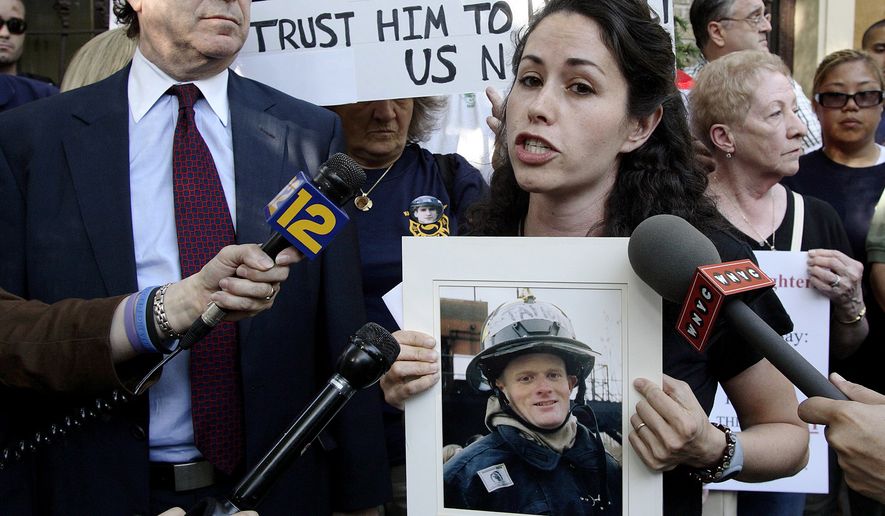OPINION:
“Trust, but verify.” President Reagan appropriated and popularized this traditional Russian proverb, then used it to great effect in his nuclear negotiations with the Soviets. As Americans face another sorrowful anniversary of the attacks of September 11, 2001, President Trump must remain mindful of the need for caution in his dealings with Afghanistan’s Taliban: Verify, then trust. There is no other way to handle so treacherous an adversary.
U.S. warriors have been dying in the benighted land of South-Central Asia since George W. Bush sent them into action against the Islamic radicals who harbored the attack’s masterminds. There is no denying the temptation to accept an imperfect deal that would bring the incessant warfare to an end. Mr. Trump’s recent peace-talk ministrations suggest he is not immune to the lure of withdrawing from the painful conflict that has claimed the lives of 2,300 U.S. troops since 2001, including 16 this year. But he hasn’t thrown in the towel — yet.
Over the weekend, the president tweeted a frank account of a peace deal near-miss that surprised even Washington’s foreign-policy officialdom: “Unbeknownst to almost everyone, the major Taliban leaders and, separately, the President of Afghanistan, were going to secretly meet with me at Camp David on Sunday . Unfortunately, in order to build false leverage, they admitted to an attack in Kabul that killed one of our great great soldiers, and 11 other people. I immediately cancelled the meeting and called off peace negotiations. What kind of people would kill so many in order to seemingly strengthen their bargaining position?”
The attack Mr. Trump referenced featured a Taliban suicide bombing last week that targeted a military vehicle, killing two NATO troops, including one American, and 10 civilians. If, as the president suggested, the murders were meant to cow the allies into suing for peace, it accomplished the opposite: Mr. Trump blew off his secret meeting with Taliban and Afghan government leaders.
Bristling over the particulars of the gathering has since ensued. Some Republicans have questioned how the president could think it proper to sit down on the eve of September 11 with those who harbored Osama bin Laden and his al Qaeda cadre. “Camp David is where America’s leaders met to plan our response after al Qaeda, supported by the Taliban, killed 3000 Americans on 9/11,” tweeted Rep. Liz Cheney of Wyoming. “No member of the Taliban should set foot there. Ever.” She’s dead right.
U.S. Secretary of State Mike Pompeo, who engages in the dicey art of diplomacy, defended the now-canceled confab, but made clear that no withdrawal of U.S. troops will occur without Taliban reassurance that violence will diminish and that there will be no recurrent use of Afghanistan as a stage for U.S. attacks. “We’re not going to withdraw our forces without making sure we achieve President Trump’s twin objectives,” he said Sunday on NBC’s “Meet the Press.”
John Bolton, whose job as national security adviser included checking for diplomatic flaws that could kill Americans, pressed for a no-frills plan of drawing down troop levels in Afghanistan from the current 14,000 to the president’s goal of 8,600 — without resorting to a handshake with the Taliban. At loggerheads over Afghanistan and other security issues, the president and Mr. Bolton parted ways on Tuesday.
The president must weigh competing views and chart a course that first secures the American homeland from attack by its mortal enemies and second, repatriates the nation’s military sons and daughters without losing one additional life needlessly. Mr. Trump readjusted and reframed his priorities on the White House lawn Monday afternoon, telling the assembled press, “We’ll get out, but we’ll get out at the right time.”
More important than the Afghanistan peace-talk venue is the peace-talk contents. And just as crucial as its contents is verification that the organization’s fighters have lived up to its terms. There should be no further discussions with the Taliban — at Camp David or anywhere else — until its leaders first offer a pledge of peace in the form of a ceasefire. There should be no withdrawal of U.S. forces until a lengthy time period has passed — measured in years, not months — during which the Taliban has proved it has honored its pledge.
Only when those who gave safe haven to the terrorists of September 11 have verified their desire to live in peace should Americans lower their guard and bequeath their trust.




Please read our comment policy before commenting.